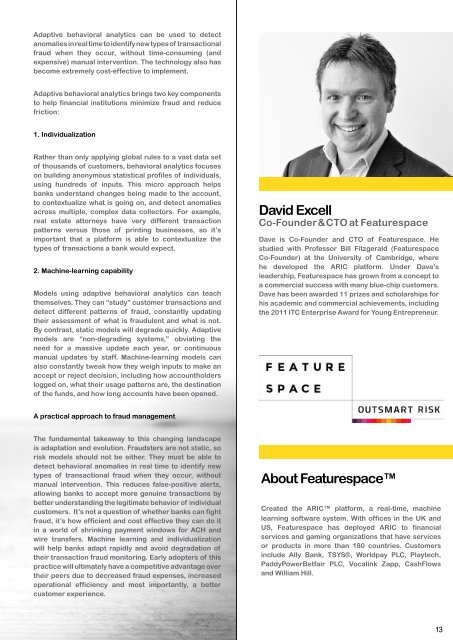PCM Vol.3 Issue 12
In this issue, we will explore the development of eCommerce, the upcoming trends in 2018 and the key challenges eCommerce merchants face trying to keep up with the fast-paced changes.
In this issue, we will explore the development of eCommerce, the upcoming trends in 2018 and the key challenges eCommerce merchants face trying to keep up with the fast-paced changes.
You also want an ePaper? Increase the reach of your titles
YUMPU automatically turns print PDFs into web optimized ePapers that Google loves.
Adaptive behavioral analytics can be used to detect<br />
anomalies in real time to identify new types of transactional<br />
fraud when they occur, without time-consuming (and<br />
expensive) manual intervention. The technology also has<br />
become extremely cost-effective to implement.<br />
Adaptive behavioral analytics brings two key components<br />
to help financial institutions minimize fraud and reduce<br />
friction:<br />
1. Individualization<br />
Rather than only applying global rules to a vast data set<br />
of thousands of customers, behavioral analytics focuses<br />
on building anonymous statistical profiles of individuals,<br />
using hundreds of inputs. This micro approach helps<br />
banks understand changes being made to the account,<br />
to contextualize what is going on, and detect anomalies<br />
across multiple, complex data collectors. For example,<br />
real estate attorneys have very different transaction<br />
patterns versus those of printing businesses, so it’s<br />
important that a platform is able to contextualize the<br />
types of transactions a bank would expect.<br />
2. Machine-learning capability<br />
Models using adaptive behavioral analytics can teach<br />
themselves. They can “study” customer transactions and<br />
detect different patterns of fraud, constantly updating<br />
their assessment of what is fraudulent and what is not.<br />
By contrast, static models will degrade quickly. Adaptive<br />
models are “non-degrading systems,” obviating the<br />
need for a massive update each year, or continuous<br />
manual updates by staff. Machine-learning models can<br />
also constantly tweak how they weigh inputs to make an<br />
accept or reject decision, including how accountholders<br />
logged on, what their usage patterns are, the destination<br />
of the funds, and how long accounts have been opened.<br />
David Excell<br />
Co-Founder & CTO at Featurespace<br />
Dave is Co-Founder and CTO of Featurespace. He<br />
studied with Professor Bill Fitzgerald (Featurespace<br />
Co-Founder) at the University of Cambridge, where<br />
he developed the ARIC platform. Under Dave’s<br />
leadership, Featurespace has grown from a concept to<br />
a commercial success with many blue-chip customers.<br />
Dave has been awarded 11 prizes and scholarships for<br />
his academic and commercial achievements, including<br />
the 2011 ITC Enterprise Award for Young Entrepreneur.<br />
A practical approach to fraud management<br />
The fundamental takeaway to this changing landscape<br />
is adaptation and evolution. Fraudsters are not static, so<br />
risk models should not be either. They must be able to<br />
detect behavioral anomalies in real time to identify new<br />
types of transactional fraud when they occur, without<br />
manual intervention. This reduces false-positive alerts,<br />
allowing banks to accept more genuine transactions by<br />
better understanding the legitimate behavior of individual<br />
customers. It’s not a question of whether banks can fight<br />
fraud, it’s how efficient and cost effective they can do it<br />
in a world of shrinking payment windows for ACH and<br />
wire transfers. Machine learning and individualization<br />
will help banks adapt rapidly and avoid degradation of<br />
their transaction fraud monitoring. Early adopters of this<br />
practice will ultimately have a competitive advantage over<br />
their peers due to decreased fraud expenses, increased<br />
operational efficiency and most importantly, a better<br />
customer experience.<br />
About Featurespace<br />
Created the ARIC platform, a real-time, machine<br />
learning software system. With offices in the UK and<br />
US, Featurespace has deployed ARIC to financial<br />
services and gaming organizations that have services<br />
or products in more than 180 countries. Customers<br />
include Ally Bank, TSYS®, Worldpay PLC, Playtech,<br />
PaddyPowerBetfair PLC, Vocalink Zapp, CashFlows<br />
and William Hill.<br />
13

















